By Kyle Thompson on February 4, 2015
This jumps off our discussions from last week. According to this post by Michael Geist, a law professor at the University of Ottawa and one of the foremost Canadian experts in this area, it looks as though Canada may be considering extending its copyright terms as part of its negotiations in the Trans-Pacific Partnership Treaty (TPP):
“If new reports out of Japan are correct, however, Canada may have caved to U.S. pressure to extend copyright term. The U.S. extended its term to life plus 70 years in 1998 in response to demands from the Disney Corporation (Mickey was headed to the public domain) and has since pressured other countries to match. NHK reports that a deal on copyright term has been reached within the TPP with countries agreeing to a life plus 70 term. Alongside Japan, Malaysia, New Zealand, and Vietnam (the TPP countries that adhere to the Berne standard), it appears that Canada has dropped its opposition to the change.”
Geist flags some interesting research by the EFF that suggests that on the whole, copyright term extensions cost consumers millions in extra royalties. My hunch is that these additional profits largely accrue to large multinational media conglomerates, since the author is, by definition, dead during those additional twenty years. This is, to my mind, textbook rent-seeking. What is rent-seeking, you may ask? I’m partial to the Economist’s definition: “cutting yourself a bigger slice of the cake without making the cake bigger.” Or, to mangle the metaphor, getting cake sent to you for an additional 20 years because of work done by a dead person at least 50 years ago.
Read More | No Comments
By tbud on February 2, 2015
Here is a link to Lawrence Lessig’s video interview with Edward Snowden. It may become relevant to our discussions of privacy/lack of privacy and its potential chilling effects on digital creativity, expression, and even the process of gaining/accessing knowledge through the Internet as a medium.
A New York Times article entitled “We Want Privacy, But We Can’t Stop Sharing” also points out:
“So it’s not surprising that privacy research in both online and offline environments has shown that just the perception, let alone the reality, of being watched results in feelings of low self-esteem, depression and anxiety. Whether observed by a supervisor at work or Facebook friends, people are inclined to conform and demonstrate less individuality and creativity. Their performance of tasks suffers and they have elevated pulse rates and levels of stress hormones.
An analogy in the psychological literature is that privacy is like sleep. Just as being unconscious for a portion of the day is restorative, so is being unselfconscious. The arousal associated with being observed and the implicit judgment drain cognitive resources. We worry about how we are perceived, which inhibits our ability to explore our thoughts and feelings so we can develop as individuals.”
Read More | No Comments
By Jon Festinger on February 1, 2015
Have done a remix of our last two sets of class slides to make them flow into the single set they were always intended to be 😉
jon
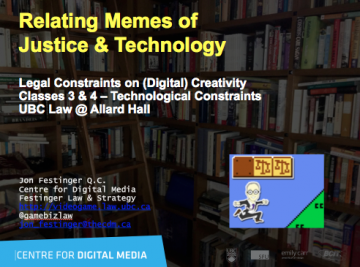
Read More | No Comments
By Ryan Vogt on February 1, 2015
This article by Sherwin Siy is an amusing piece looking at the NFL’s copyright warnings, in light of “The Big Game” today.
You may not make comments on this post I’ve written without my explicit consent.
…which you can only get by giving me a cookie. And it better be oatmeal raisin (the best cookie), not that peanut-butter cookie nonsense.
Cheers!
Read More | No Comments
By Alex B on January 31, 2015
For the class presentation on Tuesday, we will be examining the philosophical underpinnings of IP law, and their relation to creativity and creation. The brief assigned reading below is a brief introduction to the 3 brief common philosophical justifications for IP. Did I mention the reading is brief. I will be referring to the other sources during my presentation, so I provided the links in case anyone wants them. Briefly.
Assigned Readings
- http://plato.stanford.edu/entries/intellectual-property/
- only read these sections
- 1. History of Intellectual Property
- 3. Justifications and Critiques
- 3.1 Personality-Based Justifications of Intellectual Property
- 3.2 The Utilitarian Incentives-Based Argument for Intellectual Property
- 3.3 Lockean Justifications of Intellectual Property
Other Sources
- US report on patent system efficiency: http://mises.org/sites/default/files/An%20Economic%20Review%20of%20the%20Patent%20System_Vol_3_3.pdf
- Fox Film Corp. v. Doya https://supreme.justia.com/cases/federal/us/286/123/case.html#127
- Kendall v. Winsor https://supreme.justia.com/cases/federal/us/62/322/case.html#327
- Millar v. Taylor http://www.commonlii.org/uk/cases/EngR/1769/44.pdf
Read More | No Comments
By Ryan Vogt on January 29, 2015
We’ve been hearing for a long time about NSA surveillance online. Turns out, our own CSE was at it as well. Not so much a constraint on online creativity, but certainly the monitoring of online creativity.
Cheers!
Read More | 2 Comments
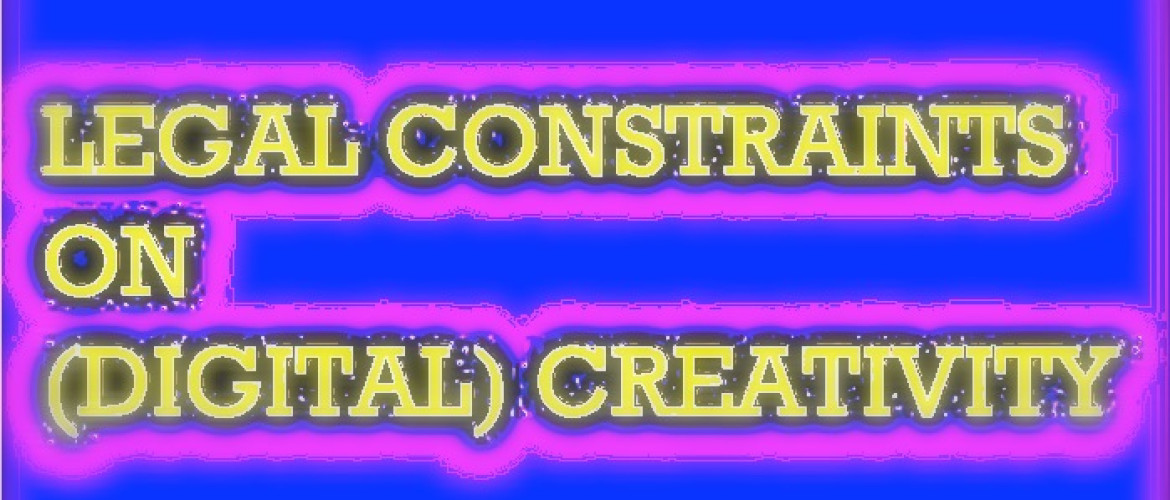




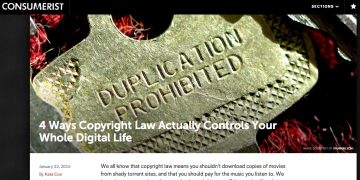

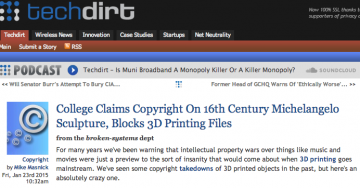
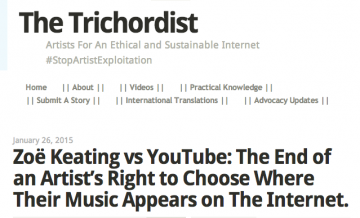


 Check out the UBC Video Game Law Course
Check out the UBC Video Game Law Course